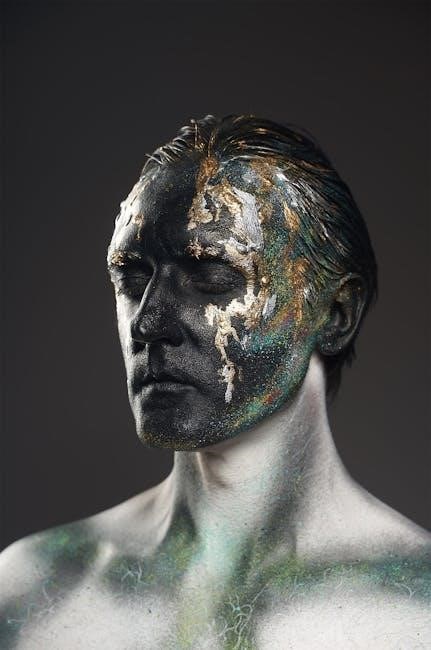
the effect lucy prebble pdf
Lucy Prebble’s The Effect is a thought-provoking play exploring love, chemistry, and medical ethics. It delves into the complexities of human emotions and scientific experimentation, challenging audiences to reflect on the interplay between the brain, drugs, and relationships. The play has garnered critical acclaim for its intense dialogue and minimalist approach, making it a significant work in contemporary theatre.
1.1 Overview of the Play
The Effect by Lucy Prebble is a compelling drama set during a clinical trial for an antidepressant. The play follows two participants, Connie and Tristan, who develop intense feelings for each other while navigating the trial’s strict protocols. As their relationship deepens, they confront questions about the authenticity of their emotions and the influence of the medication. The play blends scientific inquiry with emotional depth, exploring themes of love, identity, and the ethics of medical experimentation. Its minimalist structure and sharp dialogue create a tense, thought-provoking experience, leaving audiences to ponder the balance between biology and emotion.
1.2 The Author’s Background and Style
Lucy Prebble, a British playwright, gained recognition for her sharp, intelligent writing in plays like The Sugar Syndrome and Enron. Known for blending wit with profound themes, Prebble explores complex moral and emotional landscapes. Her work often delves into science, ethics, and human behavior, reflecting her curiosity about societal issues. With The Effect, Prebble continues her tradition of provocative storytelling, using minimalist dialogue to examine the interplay between emotions, chemistry, and identity. Her unique voice has earned her critical acclaim, including an Emmy Award for her work on Succession, solidifying her place as a leading contemporary playwright.

Plot Summary of “The Effect”
Lucy Prebble’s The Effect revolves around a clinical trial for an antidepressant, where two patients, Connie and Tristan, develop deep emotional connections. The play explores whether their feelings are genuine or mere side effects of the medication, delving into themes of love, chemistry, and medical ethics within a tense, scientific setting.
2.1 The Clinical Trial Setting
The Effect unfolds in a controlled clinical trial environment for an antidepressant medication. The sterile, medicalized setting creates a tense atmosphere, where emotions are constantly monitored. Connie and Tristan, two trial participants, navigate their feelings amidst strict rules and scientific observation. The clinical setting highlights the clash between human emotions and scientific methodology, raising questions about the authenticity of their connection. The play’s minimalist approach emphasizes the cold, controlled nature of the environment, contrasting with the intensity of the characters’ emotional experiences. This setting serves as a backdrop for exploring the ethical dilemmas of medical experimentation and emotional manipulation.
2.2 The Characters and Their Development
The play centers on Connie and Tristan, two participants in a clinical trial for an antidepressant. Connie, initially cautious and reserved, evolves as she experiences unexpected emotions, while Tristan, charming and impulsive, grapples with vulnerability. Their relationship deepens, blurring the line between genuine connection and drug-induced feelings. The characters’ development explores the tension between their growing bond and the clinical constraints governing their emotions. Through their journeys, Prebble examines the complexity of human emotions, revealing the fragility and depth of their connection amidst uncertainty.
Themes Explored in “The Effect”
The play explores love vs. chemistry, emotions, medical ethics, and antidepressants’ impact on behavior, questioning the role of science in human connections.
3.1 Love vs. Chemistry: The Role of Emotions
The Effect delves into the intricate dance between love and chemistry, examining whether emotions are genuine or drug-induced. The play’s central characters, Connie and Tristan, experience intense feelings during a clinical trial, blurring the lines between authenticity and chemical influence. Prebble raises questions about the nature of love—whether it is a biological response or a profound emotional connection. This theme challenges audiences to consider the science behind emotions and the ethical implications of manipulating feelings through medication. The play’s exploration resonates deeply, leaving viewers to ponder the true essence of love.
3.2 The Ethics of Medical Experiments
The Effect scrutinizes the ethical dilemmas inherent in medical experiments, particularly clinical trials involving antidepressants. The play portrays a controlled environment where emotions are manipulated, raising questions about the morality of such practices. Prebble highlights the tension between scientific progress and human well-being, as participants become mere subjects in a larger experiment. The blurred lines between genuine feelings and drug-induced reactions provoke moral inquiry, challenging the audience to consider the ethical implications of tampering with the human mind for the sake of scientific advancement.

3.3 The Impact of Antidepressants on Behavior
The Effect examines how antidepressants alter behavior, blending scientific inquiry with emotional depth. The play portrays characters whose emotions are chemically manipulated, raising questions about authenticity and control. As the clinical trial progresses, the line between genuine feelings and drug-induced reactions blurs, highlighting the profound impact of medication on behavior. This exploration challenges perceptions of mental health treatment and the extent to which chemicals can influence human emotions, creating a tense interplay between scientific intervention and personal identity.

The Scientific and Philosophical Debate
The Effect sparks a debate about brain chemistry, emotions, and identity, questioning whether feelings are biological or authentic. This duality challenges perceptions of human behavior and existence.
4.1 The Brain’s Role in Emotions
The Effect examines the brain’s biological basis for emotions, suggesting feelings are chemical responses rather than purely emotional experiences. The play highlights how neurotransmitters influence love, desire, and connection, raising questions about the authenticity of emotions when altered by external factors. This scientific perspective challenges traditional notions of love as a purely emotional phenomenon, instead framing it as a complex interplay of chemistry and psychology. Prebble’s exploration of the brain’s role in emotions creates a fascinating dialogue between science and human experience, leaving audiences to ponder the nature of their own feelings.
4.2 The Question of Identity and Free Will
The Effect raises profound questions about identity and free will, particularly in the context of medical experimentation. As characters’ emotions are influenced by antidepressants, the play challenges the notion of personal autonomy. It explores whether feelings are authentic or mere chemical reactions, blurring the line between genuine connection and pharmaceutical manipulation. This ambiguity prompts a deeper philosophical inquiry into whether individuals are truly in control of their choices or if their actions are dictated by biological processes. The play leaves audiences contemplating the tension between self-determination and the biological forces that shape human behavior.
The Play’s Style and Structure
The Effect employs a minimalist approach, blending intense dialogue with uncertainty and ambiguity. Its structure challenges perceptions, creating a dramatic tension that mirrors the characters’ emotional struggles.
5.1 Minimalist Approach and Intense Dialogue
Lucy Prebble’s The Effect is characterized by a minimalist approach, with a sparse, clinical setting that mirrors the sterile environment of a drug trial. The focused lighting and stripped-back stage design emphasize the emotional intensity of the characters’ interactions. The dialogue is sharp, precise, and emotionally charged, driving the narrative forward while exploring complex themes. This stylistic choice heightens the audience’s focus on the characters’ psychological journeys, creating a deeply immersive experience. The minimalist structure underscores the play’s scientific and philosophical themes, allowing the audience to connect with the raw emotion beneath the clinical surface.
5.2 The Use of Uncertainty and Ambiguity
Lucy Prebble’s The Effect masterfully employs uncertainty and ambiguity to keep audiences engaged and reflective. The play’s clinical trial setting creates a sense of detachment, while the characters’ emotions blur the line between real feelings and drug-induced responses. This ambiguity forces viewers to question what is genuine and what is a side effect. Prebble’s dialogue often leaves key questions unanswered, maintaining suspense and encouraging deeper thought. The play’s open-ended conclusion further amplifies this ambiguity, leaving the audience to ponder the true nature of love, identity, and human connection long after the curtain falls.
Reception and Reviews
The Effect received critical acclaim for its intelligent storytelling and nuanced exploration of emotions. Audiences praised its thought-provoking themes, earning it the Critics’ Circle Award for Best Play.
6.1 Critical Acclaim and Awards
Lucy Prebble’s The Effect garnered widespread critical acclaim, earning the 2012 Critics’ Circle Award for Best Play. Reviewers praised its intellectual depth, nuanced dialogue, and emotional complexity. The play’s exploration of love, chemistry, and ethics resonated with audiences and critics alike. Jamie Lloyd’s meticulous direction and the cast’s performances were highlighted as standout elements. The play’s success solidified Prebble’s reputation as a bold and innovative playwright. Its thought-provoking themes and minimalist style further cemented its place in contemporary theatre, making it a memorable and impactful production.
6.2 Audience Response and Cultural Impact
The Effect resonated deeply with audiences, sparking debates about love, emotions, and the impact of antidepressants. Its intimate, thought-provoking narrative left viewers reflecting on the interplay between chemistry and human connection. The play’s exploration of identity and free will struck a chord, fostering conversations about mental health and medical ethics. Culturally, it influenced Prebble’s later projects, like I Hate Suzie, and remains a powerful commentary on modern society’s relationship with medication and emotions. Its minimalist style and emotional depth ensured a lasting impact on both audiences and the theatre community.

The Legacy of “The Effect”
The Effect has left a lasting impact on contemporary theatre, influencing Prebble’s later works and sparking ongoing conversations about mental health, emotions, and medical ethics in society today.
7.1 Influence on Prebble’s Later Work
Lucy Prebble’s The Effect significantly influenced her subsequent projects, showcasing her ability to blend scientific inquiry with emotional depth. The play’s success solidified her reputation as a bold, insightful playwright. Its exploration of human emotions and ethical dilemmas paved the way for her later works, such as I Hate Suzie and her contributions to Succession. The critical acclaim and thematic complexity of The Effect emboldened Prebble to tackle similarly provocative topics, further establishing her as a leading voice in contemporary theatre and television writing.

7.2 The Play’s Relevance in Modern Society
The Effect remains highly relevant in modern society, addressing universal themes such as mental health, love, and the ethical implications of scientific advancements. The play’s exploration of how antidepressants affect emotions resonates with today’s widespread use of medication for mental health. Its focus on the interplay between biology and feelings challenges audiences to question the nature of emotions and identity. The play’s minimalist style and thought-provoking narrative encourage reflection on contemporary issues, making it a timely and impactful work that continues to spark important conversations about human behavior and societal norms.

The Effect by Lucy Prebble is a profound exploration of love, emotions, and medical ethics. Its minimalist style and thought-provoking themes challenge audiences to reflect on human behavior and societal norms, leaving a lasting impact on modern theatre and culture.
8.1 Final Thoughts on the Play’s Significance
The Effect by Lucy Prebble is a masterful blend of emotional depth and scientific inquiry, challenging audiences to question the nature of love, identity, and medical ethics. Through its minimalist yet powerful storytelling, the play provokes deep reflection on the interplay between chemistry and human emotion. Prebble’s work not only highlights the complexities of antidepressant use but also sparks broader conversations about free will and the ethical boundaries of scientific experimentation. Its relevance in today’s society underscores its enduring impact, making it a pivotal piece in modern theatre.
Related Posts

acls exam version c answers pdf
Get ACLS Exam Version C answers in PDF format. Free study guide, practice questions, and instant download. Prepare smarter, not harder!

explaining adhd to a child pdf
Learn how to explain ADHD to children in a simple, engaging way. Download our free PDF guide to help kids understand and manage their ADHD.

john paul jackson books pdf free download
Access John Paul Jackson’s books for free in PDF. Instantly download his spiritual teachings and revelations.